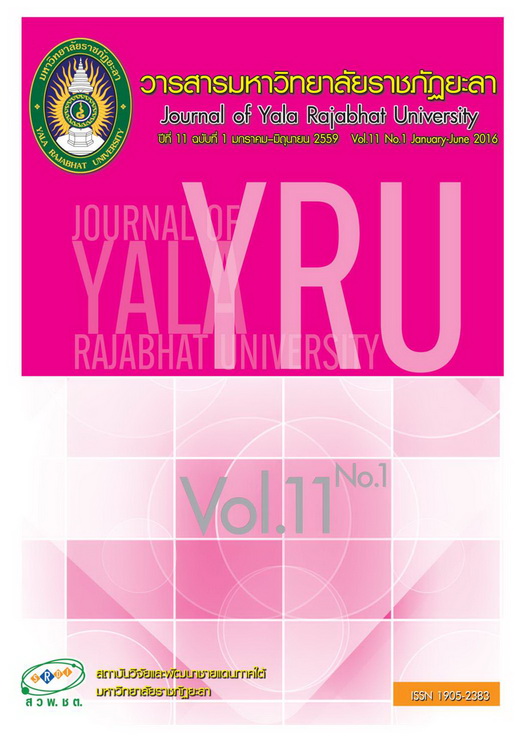ทัศนคติของผู้เรียนต่อครูผู้สอนภาษาอังกฤษที่เป็นเจ้าของภาษาและไม่เป็นเจ้าของภาษาในบริบทการเรียนภาษาอังกฤษเป็นภาษาต่างประเทศ
Main Article Content
บทคัดย่อ
บทความนี้วิเคราะห์ทัศนคติของผู้เรียนภาษาอังกฤษที่มีต่อครูผู้สอนภาษาอังกฤษที่เป็นเจ้าของภาษาและไม่เป็นเจ้าของภาษาในบริบทการเรียนภาษาอังกฤษเป็นภาษาต่างประเทศ โดยการทบทวนสิ่งที่ค้นพบจากการวิจัยที่ผ่านมาโดยนักการศึกษาในสาขาการสอนภาษาอังกฤษ บทความแบ่งเป็น 3 ส่วนหลักคือ ส่วนแรกวิเคราะห์ ให้เห็นทัศนคติของผู้เรียนภาษาอังกฤษ ที่มีต่อครูผู้สอนภาษาอังกฤษในบริบทการเรียนภาษาอังกฤษเป็นภาษาต่างประเทศ ตามมาด้วยความสำคัญของทัศนคติของผู้เรียนภาษาอังกฤษที่มีต่อครูผู้สอนภาษาอังกฤษที่เป็นเจ้าของภาษาและไม่เป็นเจ้าของภาษา ส่วนที่สองอภิปรายให้เห็นถึงคุณสมบัติของครูผู้สอนภาษาอังกฤษ ที่เป็นเจ้าของภาษาและไม่เป็นเจ้าของภาษา ซึ่งแท้จริงแล้วส่งเสริมซึ่งกันและกันเป็นอย่างดี ในสายอาชีพการสอนภาษาอังกฤษ ส่วนสุดท้ายนำ าเสนอและอภิปรายงานวิจัยของผู้เขียนเองเรื่องทัศนคติของผู้เรียนภาษาอังกฤษที่มีต่อครูผู้สอนภาษาอังกฤษที่เป็นเจ้าของภาษาและ ไม่เป็นเจ้าของภาษา โดยพบว่า ผู้เรียนภาษาอังกฤษเป็นภาษาต่างประเทศที่ทำการศึกษาเห็นความแตกต่างอย่างมากระหว่างครูผู้สอนภาษาอังกฤษที่เป็นเจ้าของภาษาและไม่เป็นเจ้าของภาษาในหลายๆ ด้านด้วยกัน
Article Details
บทความ ข้อมูล เนื้อหา รูปภาพ ฯลฯ ที่ได้รับการเผยแพร่ในวารสารมหาวิทยาลัยราชภัฏยะลานี้ ถือเป็นลิขสิทธิ์ของวารสารมหาวิทยาลัยราชภัฏยะลา หากบุคคลหรือหน่วยงานใดต้องการนำทั้งหมดหรือส่วนหนึ่งส่วนใดไปเผยแพร่ต่อหรือกระทำการใดๆ จะต้องได้รับอนุญาตเป็นลายลักษณ์อักษรจากวารสารมหาวิทยาลัยราชภัฏยะลาก่อนเท่านั้น
เอกสารอ้างอิง
2.Amin, N. (1997). Race and identity of the nonnative ESL teacher. TESOL Quarterly, 31,580-583.
3.Auerbach, E., Barahona, B., Midy, J, Vaquerano, F., Zambrano, A. & Arnaud, J. (1996).Adult ESL/literacy from the community to the community: A guidebook for participatory literacy training. Mahwah, NJ: Erlbaum.
4.Avasadanond, B. (2002). The dark side of English language education in Thailand. Learning Post in Bangkok Post [Online]. Retrieved 20 January, 2014, from: http://www.bangkokpost.net/education/site2002/cvoc0802.html.
5.Braine, G. (Ed.) (1999). Non-native Educators in English Language Teaching. Mahwah,New Jersey: LEA.
6.Canagarajah, S. (1999). Resisting Linguistic Imperialism in English Teaching. Oxford, UK.: Oxford University Press.
7.Clément, R., Dérnyei, Z. & Noels, K. A. (1994). Motivation, self-confidence and group cohesion in the foreign language classroom. Language Learning, 44, 417-448.
8.Cook, V. (2001). Using the first language in the classroom. Canadian Modern Language Review, 57(3), 402-423
9.Cutrone, P. (2001). Learner attitudes towards EFL teachers in a English conversation school in Japan: A survey of beginner level students. The Language Teacher Online, 25(12), 1-6. Retrieved May 11, 2014 from: http://www.langue.hyper.chubu.ac.jp/jalt/pub/tlt/01/dec/cutrone.html
10.Davies, A. (1991). The Native Speaker in Applied Linguistics. Edinburgh, Scotland: Edinburgh University Press.
11.Davies, A. (2003). The Native Speaker: Myth and Reality. Clevedon, UK: Multilingual Matters Ltd.
12.Deci, E. L. & Ryan, R. M. (1985). Intrinsic Motivation and Self-Determination in Human Behavior. New York: Plenum.
13.Dehbozorgi, E. (2012). Effects of Attitude towards Language Learning and Risk-taking on EFL Students’ Proficiency. International Journal of English Linguistics, 2(2),
41-48. doi:10.5539/ijel.v2n2p41.
14.Dörnyei, Z. (1994). Motivation and motivating in the foreign language classroom. Modern Language Journal, 78, 273-284.
15.Gill, S. & Rebrova, A. (2001). Native and non-native: together we’re worth more. The ELT Newsletter, 52, 1-11.
16.Hadley, G. & Hadley, H. (1996). The culture of learning and the good teacher in Japan: An analysis of student views. The Language Teacher, 20(9), 1-12.
17.Harmer, J. (1991). The Practice of English Teaching. Harlow: Longman.
18.Hoodfar, H. (1992). Feminist anthropology and critical pedagogy.: The anthropology classrooms’ excluded voices. Canadian Journal of Education, 17, 303-320.
19.Kachru, B. B. (1985). Standards, Codification and Sociolinguistic Realism: The English Language in the Outer Circle. In R. Quirk and H. G. Widdowson (Eds.), English in the World – Teaching and Learning the Language and Literature (pp.11-30). Cambridge: Cambridge University Press.
20.Kramsch, C. (1997). The privilege of the nonnative speaker. PMLA, 112, 359-369.
21.Lee, H. V. (2003). English conversation class: Does it matter if the teacher isn’t a native speaker? [Online]. Retrieved May 24, 2014, from: http://by17fd.
bay17.hotmail.msn.com/cgibin/getmsg?msg=MSG187966173.1
22.Lee, I. (2000). Can a nonnative English speaker be a good English teacher? TESOL Matters, 10(1), 1-3.
23.Lee, P., Sattayawaksakul, D., Waleesila, S. & Sriharat, P. (2009). Asian Students’ Perceptions of a Good College/University Teacher. Catalyst, 4(1) 3-12.
24.Lippi-Green, R. (1997). English with an accent: Language, ideology, and discrimination in the United States. New York: Routledge.
25.Liu, J. (1999). Nonnative-English-Speaking Professionals in TESOL. TESOL Quarterly, 33(1), 85-102.
26.Long, R. (1997). Investigating and Responding to Student Attitudes and Suggestions for Course Improvement. The Language Teacher, 21(10), 1-19.
27.Matsuda, P. K. (2003). Proud to be a nonnative speaker. TESOL Matters, 13(4), 15.
28.Maum, R. (2002). Nonnative-English-Speaking Teachers in the English Teaching Profession [Online]. Retrieved January 15, 2014, from: http://www.cal.org/ericcll/
digest/0209maum.html
29.McLaughlin, P. (2000). Native and Non-native speaker teachers: A cross-cultural case-study in approaches to approaches [Online]. Retrieved May 30, 2014,
from: http://spelta.spb.ru/proceedings/mclaughlin1.html
30.McNamara, I. (2000). The Guardian‘s Country of the Month: Thailand [Online]. Retrieved May 10, 2014, from: http://education.guardian.co.uk/print/0,3858,4100537-9976900.html
31.McNeill, A. (1994). Some characteristics of native and non-native speaker teachers of English (ERIC Document Reproduction Service No. ED 386067).
32.Medgyes, P. (1992). Native or non-native: Who’s worth more? ELT Journal, 46, 340-349.
33.Medgyes, P. (1994). The Non-Native Teacher. London: Macmillan.
34.Medgyes, P. (1996). Native or non-native: Who’s worth more? In T. Hedge & N. Whitney (Eds.), Power, pedagogy & practice (pp.31-42). Oxford: Oxford University Press.
35.Noels, K. A., Clément, R. & Pelletier, L. G. (1999). Perceptions of teacher communicative style and student’s intrinsic and extrinsic motivation. Modern Language
Journal, 83, 23-34.
36.Noels, K. A. (2003). Learning Spanish as a Second Language: Learners’ Orientations and Perceptions of Their Teachers’ Communication Style. In Z. Dörnyei (Ed.),
Attitudes, Orientations, and Motivations in Language Learning (pp. 97-136). Oxford: Blackwell.
37.Prasertsuk, N. (1990). The Influence Factors that Effect on Motivation for Learning of Students in University [Online]. Retrieved May 15, 2014, from: http://www.surdi.su.ac.th/soc3_e.htm
38.Raddaoui, A. (2000). Is the Native Speaker of English Dead? Proceedings of the TESOL Arabia Conference, 5, 99-108.
39.Scott, V. M. & De la Fuente, M. J. (2008). What is the problem? L2 learners' use of the L1 during consciousness-raising form-focused tasks. The Modern Language Journal, 92(1), 100-113.
40.Shimizu, K. (1995). Japanese college student attitudes towards English teachers: a survey. The Language Teacher Online, 19(10), 1-8 [Online]. Retrieved November 20, 2013, from: http://www.langue.hyper.chubu.ac.jp/jalt/pub/tlt/95/oct/shimizu.html
41.Spratt, M. (1985). Should we use L1 in the monolingual FL classroom? In S. A. Matthews, M. Spratt and L. Dangerfield (Eds.), At the Chalkface (pp.12-13).
London: Edward Arnold.
42.Thomas, D. (1995). A survey of learner attitudes towards native speaker teachers and non-native speaker teachers of English in Slovakia cooperative development
in ELT [Online]. Retrieved November 7, 2013, from: http://www.ettc.uwb.edu.pl/strony/ptt/apr95/thomas.html
43.Thomas, J. (1999). Voices from the periphery: Non-native teachers and issues of credibility. In G. Braine (Ed.), Non-native educators in English language teaching (pp. 5-13). Mahwah, New Jersey: LEA.
44.Watson, T. R. & Pojanapunya, P. (2009). Implicit attitudes towards native and nonnative speaker teachers. System, 37(1), 23-33.
45.Widdowson, H. G. (1994). The ownership of English. TESOL Quarterly, 28, 377-392.


